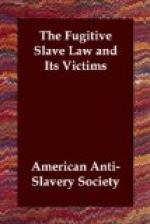ANTHONY BURNS, arrested in Boston, May 24, 1854, as the slave of Charles F. Suttle, of Alexandria, Virginia, who was present to claim him, accompanied by a witness from Richmond, Virginia, named William Brent. Burns was arrested on a warrant granted by United States Commissioner Edward Greeley Loring, taken to the court-house in Boston, ironed, and placed in an upper story room under a strong guard. The hearing commenced the next morning before Mr. Loring, but was adjourned until Saturday; May 27, to give the counsel for A. Burns time to examine the case. On Friday evening, (26th,) an attack was made upon the court-house by a body of men, with the evident design of rescuing Burns; a door was forced in, and one of the marshal’s special guard, (named Batchelder,) was killed, whether by the assailants or by one of his own party is uncertain, it being quite dark; upon the cry of Batchelder that he was killed, the attacking party retreated and made no further attempt. The trial of the case proceeded on Saturday, again on Monday, Tuesday, and Wednesday, when the Commissioner said he would give his decision on Friday. During the trial, Burns was continually surrounded by a numerous body-guard, (said to be at least one hundred and twenty-five men,) selected by Watson Freeman, United States Marshal, from the vilest sinks of scoundrelism, corruption, and crime in the city to be Deputy Marshals for the occasion. These men, with every form of loathsome impurity and hardened villainy stamped upon their faces, sat constantly around the prisoner while in the court-room, the handles of pistols and revolvers visibly protruding from their breast pockets. A company of United States troops, from the Navy Yard, occupied the court-house, and guarded all avenues to the United States court-room. The testimony of numerous highly respectable witnesses was adduced to show that Anthony Burns was in Boston a month earlier than the time at which he was said to have left Richmond. R.H. Dana, Jr. and Charles M. Ellis, counsel for Burns, made very eloquent and able arguments in his behalf. Seth J. Thomas and E.G. Parker were the counsel for Suttle, the case being constantly watched and aided by the United States District Attorney, Benjamin F. Hallett, who was in regular telegraphic communication with the President of the United States, (F. Pierce,) at Washington. An effort was made, and followed up with much patience, to buy Burns’s freedom, Suttle having offered to sell him for $1,200. The money was raised and tendered to Suttle, when difficulties were interposed, especially by Mr. Attorney Hallett, and the attempt failed. Suttle afterwards declared he would not sell Burns for any sum, but that he should go back to Virginia. On Friday morning, June 2d, Commissioner Loring gave his decision, overriding all the testimony in Burns’s favor, using certain expressions which fell from Burns in the first heat and confusion of his arrest, as testimony against him, and concluding with ordering




